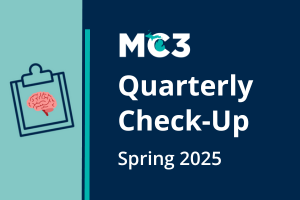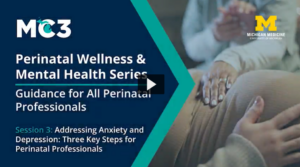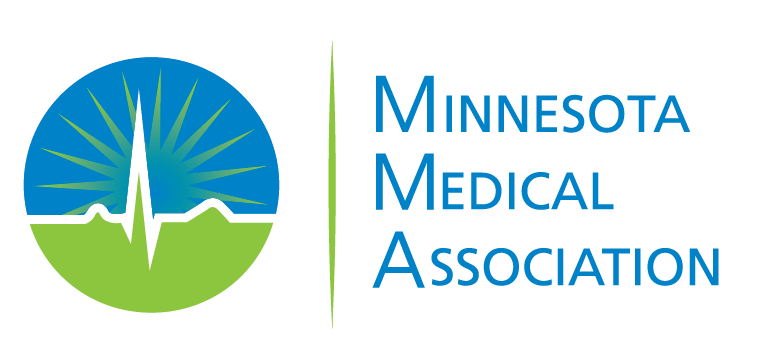Learn how MC3 is supporting the treatment of behavioral health in emergency departments, and read about MC3’s latest news, resources, and upcoming events.
Emergency departments face unique challenges in providing psychiatric care for individuals with intellectual and developmental disabilities, impacting wait times and overall experience.
These unique challenges, along with recommendations for improving patient experiences, were highlighted in a recent special report published in Psychiatry Times drafted by Victor Hong, M.D., and Hannah Reynard, D.O., M.Sc., who both serve as Consulting Psychiatrists for MC3’s Emergency & Crisis Services Consultation.
Read the full publication below.
As many as one in five women experience depression, anxiety, or another mental health condition during pregnancy or in the year after birth. Although effective treatments exist, many women don’t receive them.
To better understand what maternal mental health looks like across the U.S., the research team at the University of Michigan Perinatal Mental Health Services and Policy Program created a visual maternal mental health dashboard and maternal mental health profiles for all U.S. states. The team hopes that this information offers policymakers and maternal mental health advocates an evidence-based way to support pregnant and postpartum families in the future.
“Before we can fix a problem, we need to better describe it,” says Dr. Kara Zivin, the program’s director and the Marcia A. Valenstein, M.D., Collegiate Professor of Psychiatry. “We are proud and excited to offer these resources as a pathway to more informed problem-solving for the U.S. maternal health crisis.”
MC3 now offers no-cost child psychiatry consultations to providers at select emergency department (ED) partner sites in Michigan. Consultations include guidance on diagnosis, medication, behavioral interventions, suicide risk assessments, safety planning, and local resources post-discharge for pediatric patients. Through these consultations, MC3 aims to serve the urgent need for improved support for youth within hospital settings.
Expanding these services to select ED sites was made possible by a recent Health Resources and Services Administration (HRSA) grant awarded to the Michigan Department of Health & Human Services (MDHHS). Pilot sites include Munson Healthcare emergency rooms in Northwest Michigan.
“Our goals with this expanded service are to support emergency room staff in managing the complexities of pediatric behavioral crises, to offer critical aid during boarding situations, and to collaboratively address pediatric mental health care demands and anticipate further improvements,” said Sheila Marcus, M.D., MC3 Pediatric Medical Director. “We hope that this service supports our ER colleagues as well as families awaiting critical higher levels of care. and We look forward to learning together during this pilot phase.”
Learn more about MC3’s Emergency & Crisis Services Consultation below.
As pediatric providers and prescribers, you are the first line of defense in health care for children, which includes mental and behavioral health. By becoming knowledgeable on the diagnosis, treatment, and management of behavioral health disorders such as autism, you can be better equipped to provide resources and support to your patients and ensure they receive the comprehensive care they need.
Learn more about the importance of Autism Acceptance Month below.














No Comments |